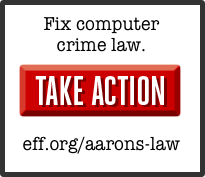Questions the Senate Should Ask At Tomorrow's Briefing on the Aaron Swartz Prosecution
Deeplinks 2013-05-01
Summary:
Tomorrow, the Justice Department will brief the Senate Judiciary staff on the prosecution of the late activist and Internet pioneer Aaron Swartz, who died in January. Swartz has become a lasting symbol for how the Computer Fraud and Abuse Act (CFAA) can be twisted by authorities to mete out draconian punishments and turn millions of Internet users into criminals.
Previously, Sen. John Cornyn asked pointed questions to Attorney General Eric Holder about the case in an oversight hearing of the Justice Department (DOJ). Thursday’s briefing will be an opportunity for the Judiciary Committee to ask more detailed questions and follow up on answers that Holder promised the Senators.
The briefing is closed to the public, but here are some questions we’d like to see asked:
1) At last month's hearing in front of the Senate Judiciary Committee, Senator Leahy asked Attorney General Holder whether the department would consider prohibiting CFAA prosecutions based solely on Terms of Service (ToS) violations. Holder replied "that is something we can look at."
Has the DOJ looked into changing its current policy to ensure prosecutions based solely on ToS violations don’t happen in the future? Have any official internal reviews been conducted to identify other prosecutions based on this dangerous legal theory? Would the DOJ support legislation to update the CFAA to clarify that ToS violations aren’t a crime?
2) At last month’s hearing in front of the Senate Judiciary Committee, Sen. Cornyn asked Holder, “On what basis did the US Attorney in Massachusetts conclude that her office’s conduct was ‘appropriate?’” Attorney General Holder said that the prosecutors “were talked to; the US attorneys were talked to.”
Did the Massachusetts US Attorney’s Office or the Justice Department itself conduct an official internal review of its handling of the Aaron Swartz case? What were the findings? Has it learned any lessons?
3) “[Senators] John Cornyn and Al Franken both wrote to DOJ earlier this year asking for information about the department's actions in the Swartz case,” Politico reported. Has DOJ answered those letters and will it release them publicly?
4) Does Holder stand by his comment made in the Senate Judiciary hearing that charging Swartz with 35 years and then offering a plea agreement of 3 months was a “good use of prosecutorial discretion”? Can he provide further justification for that view?
5) Former and current members of the Justice Department have complained that the media kept repeating that Aaron faced up to 35 years in prison, when, in fact, he would have ultimately faced much less time, given his circumstances.
Does the Justice Department believe the media is quoting an inaccurate number? And if so, why did DOJ include it in their July 2011 press release announcing Aaron’s indictment?
6) At the last briefing it was reported that “Some congressional staffers left the briefing with the impression that prosecutors believed they needed to convict Swartz of a felony that would put him in jail for a short sentence in order to justify bringing the charges in the first place, according to two aides with knowledge of the briefing.” Was this impression true? And if it was true, what was the basis for the prosecutors’ belief?
7) It was also reported that the Guerrilla Open Access Manifesto “demonstrated Swartz's malicious intent in downloading documents on a massive scale.” Do you consider this manifesto to be expression protected by the First Amendment? While public records show Aaron distributed this manifesto, do you have proof that he wrote it?
8) Aaron Swartz previously mass-downloaded academic articles from Westlaw, a legal database, to conduct a study about sources of funding for scientific research and did not release them to the public. Besides the manifesto that was written years prior to the MIT incident and does not specifically mention JSTOR, do you have any evidence that Aaron was planning on releasing the JSTO
Link:
https://www.eff.org/deeplinks/2013/05/questions-senate-should-ask-tomorrows-briefing-aaron-swartz-prosecutionFrom feeds:
Fair Use Tracker » DeeplinksCLS / ROC » Deeplinks
